The reasons why we kiss and hug might seem simple and self-evident, but 64% of the world's cultures don't even kiss at all. And those that do don't even really know why they do it.
Far more about our lives than we realize is understood through touch. Humans (not to mention animals) can communicate an immense amount of information, from aggression to benevolence, with just a handshake or a tap on the shoulder.
As social beings, this desire to connect through human contact is ingrained in us to the point where we do it every day without giving it much thought at all.
Likewise, the intimate forms of touch, like hugging and kissing, feel equally natural and just plain good. But why is this and why do we do these things?
Obviously, a hug isn’t always sexual and even a romantic kiss doesn’t always lead to sex, so one can’t say that it’s solely a gateway to procreation (for lack of a better phrase). Many studies have been done to better understand these forms of intimacy and the results show that both hugging and kissing, arbitrary or self-evident though they may seem, have evolved for very specific biological reasons and have strong emotional, psychological, and physical value.
Why We Hug
In terms of understanding why we do it, the hug is a little more straightforward than the kiss. Hugging is a near universal action, even among other mammals. Yes, we are anthropomorphizing when we say that two elephants who are linking trunks are “hugging.”
But, for all intents and purposes, acts like elephants linking trunks, cats nuzzling, or chimps holding each other, do have the same emotional purposes of comfort and bonding that we humans associate with a hug. As such, we can begin to see that there is a deeply rooted, primal history of mammals using touch to promote trust.
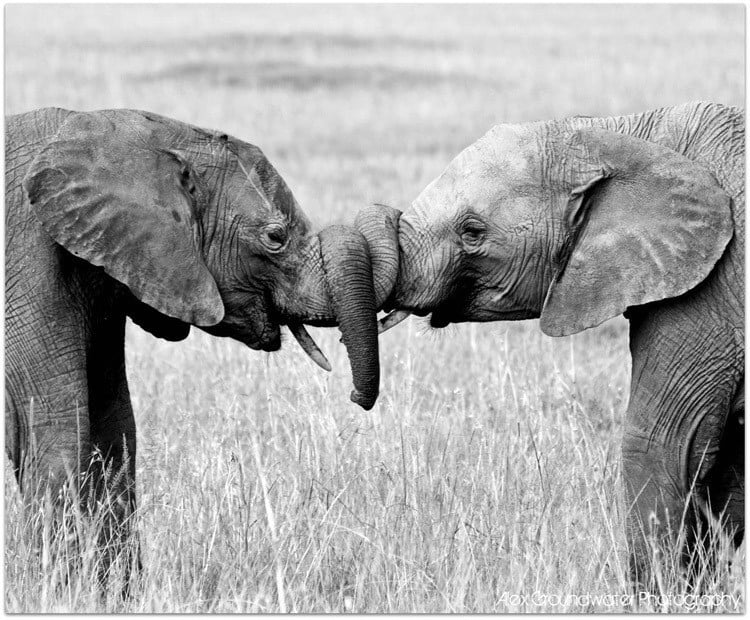
The act of hugging releases oxytocin, also known as “the cuddle hormone,” in the brain. Oxytocin is a neuropeptide (a signaling molecule produced by neurons) that promotes feelings of devotion and trust. As Matt Hertenstein, psychologist as DePauw University, told NPR, the release of oxytocin “really lays the biological foundation and structure for connecting to other people.”
Likewise, as the beanie wearing co-ed carrying a “Free Hugs” sign may have told you, hugs have a slew of physical and mental health benefits. For one, when we hug, our stress levels go down. Not only do people release tension as a result of feeling safe in the arms of someone they trust, but the action also reduces the amount of the stress hormone, cortisol, in our bodies. And when cortisol dips, the feel-good chemicals — dopamine and serotonin — rise.
Furthermore, research has shown that a hug can help lower blood pressure.
The sensation of someone touching your skin activates pressure receptors called Pacinian corpuscles, which send signals to the vagus nerve of the brain. The vagus nerve affects a wide range of bodily functions, and in this case, stimulation of the vagus nerve typically results in a reduction in heart rate and blood pressure.
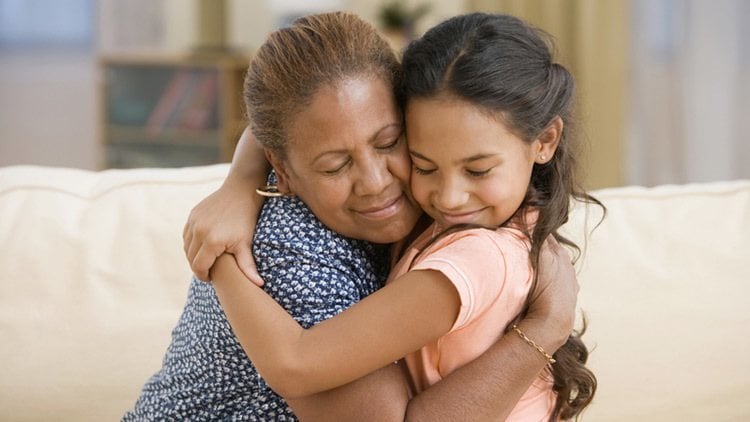
In a study done at UNC Chapel Hill, participants underwent an experiment in which one group hugged their partners before describing a recent stressful event, while another group went without physical contact.
The heartbeat of non-hugging participants went up ten beats per minute, whereas the heartbeat of the group permitted to hug only increased by five beats per minute. In addition, the blood pressure of those without contact rose more than double that of the huggers.
Other studies have shown that, while beneficial, touch among friends does not produce nearly as much stress relief as contact with a partner. This says something about how hugs evolved. Both physically and chemically, our bodies are equipped to relax when in the arms of a partner.
Hugs are a way to bond and build trust with an individual that is outside the security of your genetic line (of course, an unexpected hug from a complete stranger is unsettling, to say the least). Hugs are beneficial when you make yourself purposefully vulnerable to a specific person and therefore invite a connection. Biologically, we are putting immense trust in those we love.
Why We Kiss

At a glance, kissing is pretty strange. Essentially, you are pressing you and your partner’s mouths together, exchanging saliva and exposing you both to various colds, flus, and sores. Besides simply enjoying it, people have no real clue why we kiss, and, in the moment, probably don’t care all that much.

Historically, evidence of romantic kissing can be traced back 3,500 years to Hindu Vedic Sanskrit texts. In these texts, kissing is described as inhaling each others’ souls (so, I suppose we are using the term “romantic” loosely). By the 2nd century, the Kama Sutra had a whole chapter on kissing. And today, the act is so normalized that no one gives much thought to why we kiss.
However, unlike hugging, kissing is not a near-universal behavior.
In fact, research published earlier this year in American Anthropologist showed that when broken down into cultural groups, only 46% of cultures kissed romantically (keep in mind that this is still 90% of the global population). And of the 64% that don’t kiss, most find the idea pretty gross. These results point to the conclusion that kissing must be a learned behavior that has evolved with human socialization, as opposed to an instinctive action.
On the other hand, there is still some evidence out there to suggest that kissing is innate, and that the reasons why we kiss are instinctual. While not all humans kiss, our relatives the chimp and bonobo do. Neither of these species, however, are specifically romantic.
Chimps kiss as a form of reconciliation, but this tends to only be between males. And since bonobos have sex about as casually and commonly as humans high-five, a kiss on the mouth is rather tame.
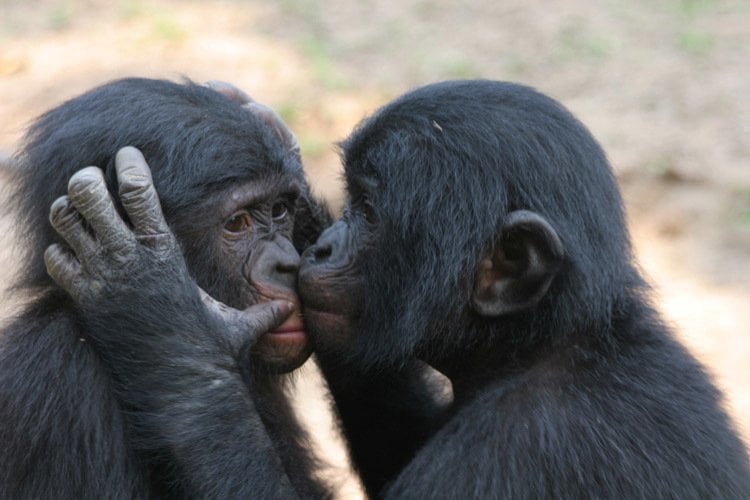
It is possible that the physical act of kissing originates from prehistoric mothers passing chewed food via their mouths to feed their babies. Again, this is not romantic (understatement of the month), but it does point to a possible origin from which this strange, ingrained act of intimacy may have sprouted.
But, no matter the exact source, why have we evolved to kiss; what explains why we kiss today?
The most widely accepted theory on why we kiss is that we’re subconsciously sniffing each other out. When our faces are that close together, our pheromones come into play. The exchange of those bodily chemicals can provide information about whether or not two people will make strong offspring and this can greatly influence attraction. Unlike other animals, humans have an atrocious sense of smell. Most mammals can smell pheromones without smashing their faces together, but humans need to be that intimate.
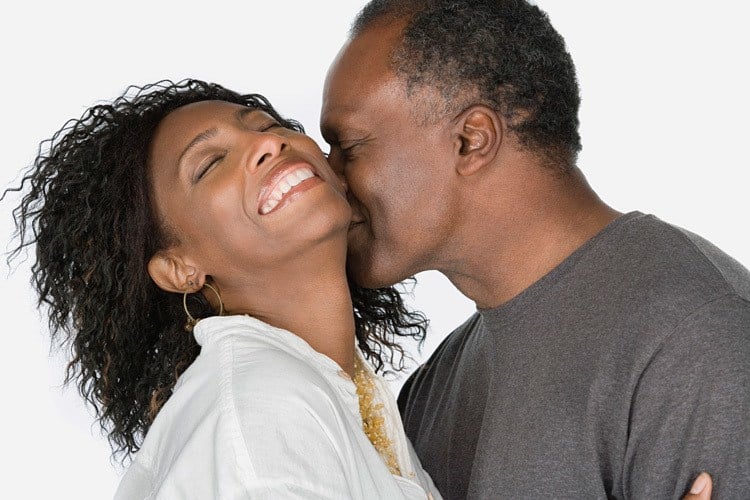
Image Source: The Huffington Post
For instance, subconsciously, women are more attracted to men with genes for immune system proteins that are different from their own, as it would mean that their child would potentially be born with a stronger immune system.
In an online questionnaire about kissing done by Oxford University, 900 adults responded to questions about kissing in long-term and short-term relationships. It turned out that women not only ranked the importance of smell during kissing more highly, but that the importance of kissing also increased when women were most fertile.
Furthermore, romantic kissing, like hugging, is simply an intimate form of touch that promotes a strong bond between two individuals. Often times, especially in long-term relationships, the comfort a kiss provides can be as important as its role in sexual arousal. A kiss elicits those same positive feelings associated with touch, except it is even stronger with kissing because human lips and tongues are jam-packed with nerve endings. Evolutionary biology aside, the pleasure-inducing sensitivity of all these nerves has always been one of the biggest reasons why we kiss.
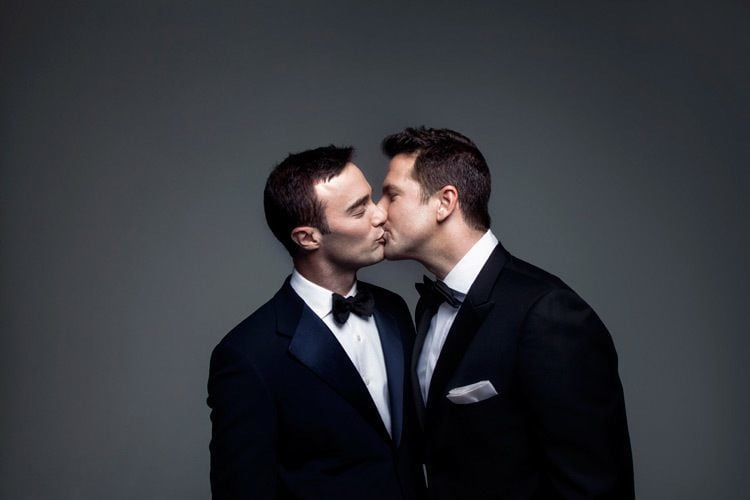
Image Source: M. Sharkey
Even with all the sentimental notions and health benefits related to kissing and hugging, Americans have managed to stay true to their Puritan roots when it comes to intimate contact. Even platonically, we touch and are touched far less often than we could, and maybe should, be.
According to Dacher Keltner, professor of psychology at University of California, Berkeley and founding director of Greater Good Science Center, a wave of studies is now documenting the “incredible emotional and physical health benefits that come from touch. This research suggests that touch is truly fundamental to human communication, bonding, and health.”
At any rate, hugging and kissing sure beat just smelling each other.





